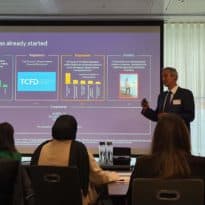 Sustainable and ESG-focused funds should sit at the heart of investors’ long-term portfolios now, with the seismic shift seen towards such mandates in recent years unlikely to be reversed, according to Adrian Lowcock at Willis Owen.
Sustainable and ESG-focused funds should sit at the heart of investors’ long-term portfolios now, with the seismic shift seen towards such mandates in recent years unlikely to be reversed, according to Adrian Lowcock at Willis Owen.
The head of personal investing at the firm says the investment style had outstripped non-ESG approaches over three and five years, with a five-year return of 94.49% for the MSCI ACWI ESG leaders index versus the MSCI ACWI index return of 93.75%.[1]
While they may have been satellite funds in the past, meeting the desire of some individuals who wanted to invest in line with their ethics and principles, Lowcock says these are no longer “nice to have” investments.
“These funds are core holdings now, with over £61bn in responsible funds in February this year, nearly double the £34.3bn from a year earlier (February 2020).
“Whereas previously, ESG was a secondary consideration, a nice to have tilt to portfolios, the world has been changing. A focus on companies which do less harm to the environment, be that alternative energy, greener food production or waste reduction, are here to stay, and crucially, they are also rewarding investors,” he said.
“Clearly the COVID pandemic has accelerated an existing trend as people took lockdown as an opportunity to revaluate their lives and could witness first-hand the effect human activity was having on their local environment.
“As with any investment, there will be periods of underperformance. For example, with vaccines being rolled out investors have focused on the end of the pandemic and there has been a shift to value and recovery stocks, which includes oil and airline industries that typically don’t feature in ESG-focused funds.”
Lowcock believes the longer-term outperformance of sustainable, ESG and ethical funds will continue from here, with many of the old-guard economy stocks likely to struggle unless they change.
“ESG investing is now a huge part of mainstream investing. The development of the fourth digital age is also supporting progress in ethical investing as new technologies make opportunities more cost effective, and the use of data means companies can better track the impact they have, and also be more accountable for their behaviour.
“However, where previously ethical funds would have avoided some sectors and stocks outright, these days fund managers are willing to engage with companies and management to help influence and support change.
“These trends are not one, three or even five-year ones. They are here to stay, and investors who are not considering them are going to miss out over the long-term.”
[1] Total Return in Pounds Sterling to 31st March 2021.

































